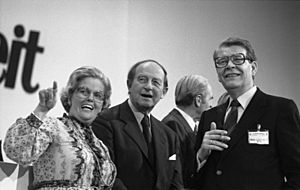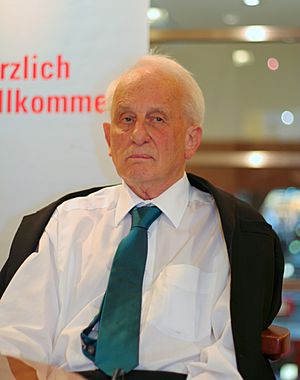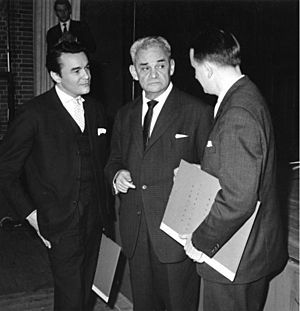Rolf Hochhuth facts for kids
Rolf Hochhuth (born April 1, 1931 – died May 13, 2020) was a German writer and playwright. A playwright is someone who writes plays for the theater. He was most famous for his 1963 play The Deputy. This play suggested that Pope Pius XII did not do enough to stop Adolf Hitler's killing of Jewish people during World War II. Hochhuth was a controversial person because of his plays and other public comments. He also caused debate in 2005 when he defended a British writer, David Irving, who had controversial views about the Holocaust.
Contents
Life and Early Career
Growing Up
Rolf Hochhuth was born in a town called Eschwege in Germany. His family was Protestant and came from the middle class. His father owned a shoe factory, but it went out of business during the Great Depression, a time when many people lost their jobs and money.
During World War II, Rolf was a member of the Deutsches Jungvolk. This was a group for young boys that was part of the Hitler Youth.
In 1948, he started training to become a bookseller. From 1950 to 1955, he worked in bookstores in different German cities. At the same time, he went to university classes as a guest student. He also started trying to write his own stories. From 1955 to 1963, he worked as an editor for a big publishing company in West Germany.
The Play The Deputy
Rolf Hochhuth's play, The Deputy, came out in 1963. Its original German title meant The Deputy, a Christian Tragedy. The play caused a lot of discussion and disagreement. This was because it criticized Pope Pius XII and his actions during World War II.
The play's publisher and a journalist helped defend the play. They said it was important for free speech, even though they thought the play had some problems. Later, a former spy from Romania claimed the play was part of a plan to make Pope Pius XII look bad. However, a major German newspaper said that Hochhuth did not need any help to present his view of history.
The first version of the play was very long, about eight or nine hours! Because of this, no audience ever saw the full original play. Each theater production changed the text to make it shorter. The play included the true story of Kurt Gerstein. Gerstein was a strong Protestant who joined the SS, a powerful Nazi group. He wrote down what he saw about the gas chambers, where many people were killed. After the war, he died as a POW, which means a prisoner of war.
The Deputy was first performed in Berlin, Germany, on February 20, 1963. It was later performed in London, England, by the Royal Shakespeare Company. An edited version of the play also opened on Broadway, a famous theater district in New York City, in 1964. It ran for 316 performances.
In 2002, the play was made into a film called Amen by Costa-Gavras. This movie focused more on the story of Kurt Gerstein.
The Play Soldiers and Crash Theories
Hochhuth's next play was called Soldiers, An obituary for Geneva (1967). This play claimed that Winston Churchill, the British Prime Minister during World War II, was responsible for the death of General Władysław Sikorski. Sikorski was the Prime Minister of the Polish government that was in exile. He died in an airplane crash in 1943. The play suggested that Sikorski was murdered on Churchill's orders, which went against the official story that it was an accident. The pilot of the plane was still alive and sued the London theater that put on the play. He won his case, which caused problems for the theater.
This part of the play often overshadowed Hochhuth's main idea. He wanted the play to start a discussion about whether it was right to bomb civilian areas during World War II. He especially focused on the Royal Air Force raids on Hamburg in 1943, known as Operation Gomorrah. The play included a long, made-up debate between Winston Churchill and a peaceful bishop named George Bell. The play used some ideas from the British writer David Irving, who later became known for denying the Holocaust. Irving and Hochhuth remained friends for a long time.
In 1967, there was a big disagreement in Britain. The play was supposed to open at the Royal National Theatre, but the theater's board stopped it. This happened even though the play had support from important people like Kenneth Tynan and Laurence Olivier. At the time, David Irving was one of the few people who fully supported Hochhuth's idea about Churchill. Other experts thought it was very unlikely. The play was still performed shortly after in London's West End.
The Play Sommer 14 - A Dance of Death
The play Sommer 14 - A Dance of Death was first performed in English in August 2014. This happened at the Finborough Theatre in London.
The Novel A Love in Germany and the Filbinger Case

In 1978, Rolf Hochhuth wrote a novel called A Love in Germany. The book was about a love story between a Polish prisoner of war and a German woman during World War II. This novel started a public discussion about the past of Hans Filbinger. Filbinger was a politician who was the Minister-President of a German state. It became known through Hochhuth's book that Filbinger had been a Navy lawyer and judge at the end of World War II. This led to Filbinger resigning from his position.
For his novel A Love in Germany, Hochhuth received an award called the Geschwister-Scholl-Preis in 1980. In 1983, the famous director Andrzej Wajda made the story into a film called Eine Liebe in Deutschland.
The Play Alan Turing
His 1987 play, Alan Turing, was about one of the people who helped create modern computer science. Alan Turing also played a very important role in breaking German secret codes during World War II.
Controversy Over Comments
In March 2005, Rolf Hochhuth became involved in another controversy. During an interview, he defended David Irving, a writer who had controversial views about the Holocaust. Hochhuth called Irving a "pioneer of modern history" and said he had written "magnificent books." When asked about one of Irving's very offensive comments, Hochhuth said it was just a provocative joke.
Paul Spiegel, who was the head of the Central Council of Jews in Germany, said that Hochhuth's statements meant he was also denying the Holocaust. After weeks of public outcry, Hochhuth apologized for his comments.
Works
- Plays
- The Deputy, a Christian Tragedy (1962)
- Soldiers, Necrology on Geneva (1967)
- Guerrillas (1970)
- The Midwife (1972)
- Death of a Hunter (1977)
- The Survivor (1981)
- Alan Turing (1987)
- Wessis in Weimar (1993)
- McKinsey is Coming (2004)
- Heil Hitler! (2007)
- Sommer 14 (2014?)
- Novels
- A Love in Germany (1978)
Hochhuth also helped write scripts for movies and television shows:
- Berliner Antigone (1968)
- Élo Antigoné (1968)
- Ärztinnen (1984)
- Effis Nacht (1998)
- A Love in Germany (1983)
See also
 In Spanish: Rolf Hochhuth para niños
In Spanish: Rolf Hochhuth para niños
 | William L. Dawson |
 | W. E. B. Du Bois |
 | Harry Belafonte |



